
 By David Mills
By David MillsWashington Post Staff Writer
Wednesday, May 13, 1992
"Souljah was not born to make white people feel comfortable. I am African first. I am black first. I want what's good for me and my people first. And if my survival means your total destruction, then so be it. You built this wicked system. They say two wrongs don't make it right, but it damn sure makes it even."
- Sister Souljah, from the song "The Hate That Hate Produced," 1992
After the Rodney King verdict and its fiery aftermath, Sister Souljah, a rapper and orator, appeared on NBC's "Sunday Today" with Sen. Bill Bradley (D-N.J.) and Rep. Charles Rangel (D-N.Y.). And she sat alongside black professors from Yale and Columbia on Bill Moyers's PBS series "Listening to America."
She calmly explained that African Americans are "at war," and that the explosion in Los Angeles was "revenge" against a system of white oppression.
But during an interview in Washington last week, Souljah's empathy for the rioters reached a chilling extreme. Forget the statistics emerging on the racial variety of looters and people who died. Forget the economic motives of those who plundered stores. To Souljah, this was a black-on-white "rebellion," plain and simple and righteous.
"I mean, if black people kill black people every day, why not have a week and kill white people? You understand what I'm saying? In other words, white people, this government and that mayor were well aware of the fact that black people were dying every day in Los Angeles under gang violence. So if you're a gang member and you would normally be killing somebody, why not kill a white person? Do you think that somebody thinks that white people are better, or above dying, when they would kill their own kind?"
(Read the rest of the story after the jump.)
As she said on "Sunday Today": "Unfortunately for white people, they think it's all right for our children to die, for our men to be in prison, and not theirs."
Sister Souljah will be back on "Today" this morning, live from Burbank. Consider it a wake-up call.
Whose analysis of the violence in Los Angeles, in the months and years to come, will matter more? The conservative pundit's, placing blame squarely on young criminals who "terrorized" a city? The liberal politician's, bemoaning poverty and the neglect of our cities? Or the radical rapper's, asserting that white people and Korean merchants had it coming?
Ask the kids who watch MTV.
The King verdict and its backlash have shown America the power of hip-hop music as a political medium. Television coverage of the crisis confirmed, as never before, the status of hard-edged rappers as spokesmen for the black lower class, delegates of America's angry youth. Opinion-makers. Leaders.
"Whoever wants to speak to young people will have to come through the corridor of hip-hop," says Sister Souljah, whose debut album, "360 Degrees of Power," came out last month. Born Lisa Williamson twentysomething years ago, she was a New York community activist and established public speaker before launching her rap career under the auspices of Public Enemy, standard-bearers of hip-hop's militant wing. As rap has grown in popularity among black and white listeners, offering everything from cute kids (Kris Kross) to professing Christians (Hammer) to raunchy comedians (2 Live Crew), political rappers have come to be considered its conscience.
"When it was really understood that rap music makes millions of dollars, and that rap artists represent the voices of millions of young people," Souljah says, "I think that's when all the institutions of America came to their senses about having to involve a rap artist in their analysis. {With} a rebellion carried out primarily by African youth, how could you ignore African youth? It would be impossible. Not if you were a serious journalist."
Bill Moyers showed a clip from one of Souljah's fulminating videos -- The time for scared, lip-trembling, word-changing, self-denying, compromising, knee-shaking black people is over! -- then asked her, "How would you like me -- I'm white -- to interpret your work?"
"Well," she responded politely, a bit of the Bronx in her voice, "I don't make my work for you to interpret it. I make it for black young people so that they can understand that we are at war, that we have to be strong-minded, that we have to be productive, that we have to be unafraid of expressing ourselves and getting what we want in this society."
Rappers like Sister Souljah are shattering the boundaries between performer and audience, and between entertainment and politics. When a jury acquitted the four Los Angeles policemen who'd beaten Rodney King, X-Clan, a Brooklyn-based activist rap group, was performing at San Francisco State University. The rappers got the news, stopped the show, then led an impromptu march of about 200 people, chanting "Whose streets? Our streets!" and "{Expletive} the police!"
Which echoes N.W.A.'s infamous revenge fantasy "{Expletive} tha Police," a dream of "a bloodbath of cops dying in L.A." That song, denounced by the Fraternal Order of Police, concludes with the rappers sitting in judgment of a white officer: "The jury has found you guilty of being a redneck, white-bread {expletive expletive}." And the cop pleads, "I want justice! I want justice!" That came out in 1988.
Two members of N.W.A. were interviewed by "MTV News" (MTV News?) when the burning and looting got started in south-central. And appearing live on MTV was Chuck D of Public Enemy, whose words "fight the power" reverberate on the soundtrack of Spike Lee's "Do the Right Thing" while the white-owned pizzeria burns to the ground. That came out in 1989.
And Spike Lee begat L.A.'s John Singleton, whose hit film "Boyz N the Hood" took its name from an old N.W.A. song. That movie launched the acting career of ex-N.W.A. member Ice Cube, who provided a new rap for the album "How to Survive in South Central," yet another piece of ironic foreshadowing. Be alert, stay calm, as you enter the concrete Vietnam ... That came out last year.
As did Ice Cube's warning to Korean merchants: Pay respect to the black fist, or we'll burn your store right down to a crisp. That's from his million-selling album, "Death Certificate."
Entertainment as politics? Politics as entertainment?
On "The Arsenio Hall Show" last Thursday night, while Johnny Carson and Buddy Hackett were laughing it up in another universe, rapper KRS-One was committing "lyrical terrorism," unleashing brand-new rhymes:
Now I'm hardcore, walking on the ave,
Watching white people look at me then walk fast,
After beating us, raping us and robbing us.
Four hundred years of that's what's inside of us.
Take a look at me now, I'm really your creation ...
Even ABC's "Nightline" felt the funk. On May 4, Ted Koppel's extraordinary open-air conversation with L.A. gang members ended with one of them looking into the camera and rapping over a hard beat:
When you're living in poverty, crazy you gotta be,
'Cause ain't nobody out here looking out for me but me ...
This is a new media age. Top 40 radio is dead, and "{Expletive} tha Police" is in the American consciousness. Carson is history, and KRS-One is in America's bedrooms requesting "amnesty" for 13,000 (presumably black) prisoners in Los Angeles. Daily newspapers are folding, and in record stores across America you'll find Ice Cube's news-pegged commentaries, such as this from a duet with Sister Souljah: "You teach freedom of speech, as long as black men don't say Howard Beach, Rodney King or Bensonhurst. Tawana and Tasha, we ain't forgot ya."
Remember too: Everything that has happened in Los Angeles since the King beating is due to a camcorder. The video images were news, and they were evidence, but they also became a unit of language for hip-hop artists. They were spliced into a video for the group B.W.P., and reenacted in a video for Public Enemy. Just as electronic images of the riot/rebellion are bound to show up in rap videos too.
CNN today, MTV tomorrow. At this rate, not only will the revolution be televised, it'll be on pay-per-view. With lots of rap stars.
An Eye for an Eye Sister Souljah was sitting in the Capital Hilton lounge pantomiming her "dramatic" stage persona for the benefit of a photographer. Scrunched brow, out-thrust fist, round hot eyes, lips moving staccato.
A finely dressed, middle-aged white woman, sitting nearby with her spoon in some ice cream, stared oddly at the young black woman, then smiled when caught by the eyes of a third party.
Souljah was in Washington last Tuesday to tape an appearance on Black Entertainment Television. This Sunday she'll be here again, as the keynote speaker at the Malcolm X Day Celebration in Anacostia Park. (X-Clan will be there too, performing.) What she thinks matters.
And the interview at the Hilton may foretell how the militant wing of the hip-hop movement deals with the L.A. crisis in its art. In one sense, Souljah is emblematic of rap-as-politics. Her "360 Degrees of Power" contains probably the most fervid denunciations of white people ever marketed by a major label. (She's signed to Epic Records, which is owned by Sony. How's that for blacks, whites and Asians working together?)
But "360 Degrees" is off to a slow start in the marketplace, and some observers say hip-hop fans consider it too shrill, even though Souljah is a respected voice. "She's not afraid to take a stand," says James Bernard, senior editor of the Source, a magazine of "hip-hop culture and politics." "She's one of those uncompromising voices."
But "I'm not sure what Sister Souljah adds to the music, in a musical sense," he says. "When she rhymes, people don't say, 'My God, that's the most incredible line I ever heard in my life.' "
"She kind of screams it out. That's her whole delivery," says Havelock Nelson, rap columnist for Billboard magazine. "When I see her speak, I feel the passion and I become moved. You can feel the pain, the anger, whatever she's trying to put across. But I don't think it transfers to the record. I don't think the people want to hear the same lecture in the middle of a jam. A lot of people aren't giving her their ear."
Ironic, then, that Souljah declares on her album: "America is always trying to strangle and silence black people." How does that jibe with her own status as a blossoming media star? Her place in Bill Moyers's Rolodex?
"There's a difference," she said. "I don't evaluate the world solely on my own individual accomplishments, because I recognize that I'm an unusual victory {under} this system of oppression. Usually this system is successful in crushing the spirit, the mind and the hearts of young people. Because I've been able to grow up in the welfare system, and go through the public housing system, and go through all these government programs, and come out still in control of my own mind and thoughts, it's unusual. And it would be naive for me to try to evaluate everyone else by that standard."
Souljah is a woman of poise and intelligence. She attended Rutgers University between 1981 and 1987, majoring in history, though she didn't earn a degree. According to her publicity material, she has lectured in South Africa, Europe and the Soviet Union.
Her views on the violence in Los Angeles are, to say the least, challenging. Consider Rodney King's own televised news conference, during which he beseeched the rioters to stop. "Can we all get along?" he asked in a cracking voice. "We've got to quit. ... It's just not right."
To many who saw this, King's appeal was heartfelt and touching. But Souljah compared it to the scene in "Roots" where Kunta Kinte is beaten and beaten until he accepts the slave name "Toby." That news conference was Rodney King saying, "My name is Toby."
"After you beat the hell out of somebody, of course they're going to submit to you," she said. "Why would I think that Rodney King, after being beaten brutally by the police, is sober-minded? Why would I think Rodney King, as a black man who has no power in this system, would think that he {could} say what he really thinks and believes? So it meant nothing to me. He's just a symbol of what has happened to our people historically.
"Rodney King is only a symbol of a million other black men that have been beaten -- brutalized by the police -- who didn't have what we thought was the benefit of having it on videotape. Rodney King is only a symbol of a criminal justice system that leaves 25 percent of {young} African men in this country in prison or under court supervision."
When America saw young people rampaging on the streets of Los Angeles, and buildings ablaze, and white men being dragged from their vehicles and beaten, didn't that only reinforce the presumed attitude of the Simi Valley jury -- thank God for the police, the thin blue line that protects us and our property from those violent criminals?
"Black people from the underclass and the so-called lower class do not respect the institutions of white America," Souljah replied. "Which is why you can cart out as many black people on television as you want to tell {them} that was stupid. But they don't care what you say. You don't care about their lives, haven't added anything to the quality of their lives. And then {you} expect them to respond to your opinions, which mean absolutely nothing? Why would they?"
But the people perpetrating that violence, did they think it was wise? Was that wise, reasoned action?
And this is when she said, "Yeah, it was wise. I mean, if black people kill black people every day, why not have a week and kill white people? You understand what I'm saying?"
But what's the wisdom in it, the sense in it?
"It's rebellion, it's revenge. You ever heard of Hammurabi's Code? Eye for an eye, a tooth for a tooth? It's revenge. I mean, that seems so simple. I don't even understand why anybody would ask me that question. You take something from me, I take something from you. You cut me, I cut you. You shoot me, I shoot you. You kill my mother, I kill your mother."
And the individuals don't matter?
"What individuals? If you killed my mother, that mattered to me. That's why I killed yours. How could the individuals not matter? You mean the white individuals, do they matter? Not if the black ones don't," she said. "Absolutely not. Why would they? If my child dies, your child dies. If my house burns down, your house burns down. An eye for an eye, a tooth for a tooth. That's what they believe. And I see why."
The temperature of the conversation was rising. Souljah was asked if her endorsement of revenge -- "Revenge is acceptable, yes" -- was outweighed by any sort of transcendent respect for human life.
"Am I human?" she said sharply. "Do they kill us? Do they kill us and beat us? Police. Did they kill Latasha Harlins, did the Koreans kill her? They killed her, and they were convicted of the crime. They did not one day in jail. The Korean woman did not one day in jail."
Grocer Soon Ja Du was convicted of voluntary manslaughter in the 1991 shooting of teenager Latasha Harlins in a dispute over a bottle of orange juice. She was sentenced to probation, a fine and community service. That shooting, like the King beating, was captured on videotape, by a store security camera, though much of America didn't see it until after the riots.
But did all the Korean merchants in Los Angeles kill that girl?
"No, but guess what? Then the Koreans, if they don't want to be lumped in the same pot, they should have condemned and moved to prosecute that woman. And shown that they gave a damn about African life. But when they didn't, they verified that that was okay, and brought on themselves that which they received."
Would, then, any degree of "revenge" have been morally acceptable to Sister Souljah?
"This is my statement: I don't think that anything we can do to white people could ever even equal up to what they've done to us. I really don't," she said. To her, apparently, racism is original sin. White people are born guilty. And there's no Redeemer.
"Will I condemn the people for what they did in Los Angeles? No, I don't condemn them for that," she said. "In the real world, black people die on a daily basis. Always rooted in the hands of white supremacy. That's what I know."
The discussion came to an end when Souljah refused to address a hypothetical question: "Had you been there at the time, would you have struck a match?"







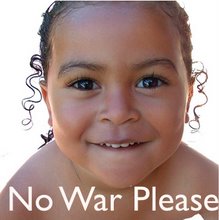





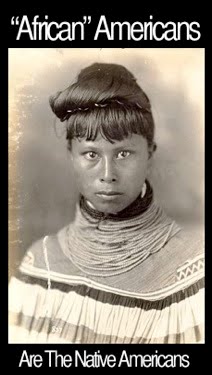




























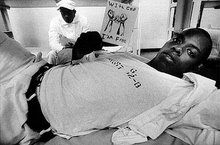
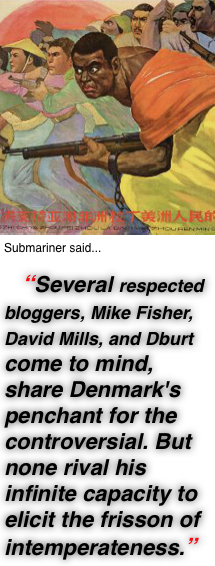


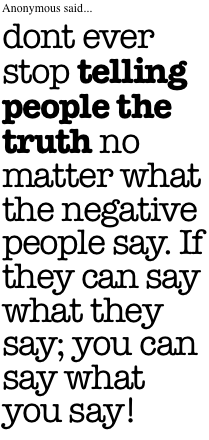

















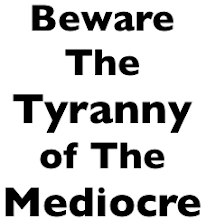





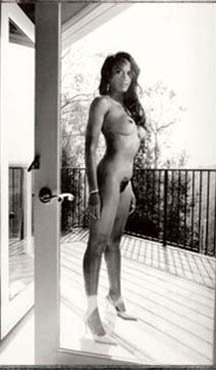







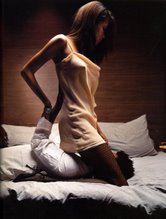





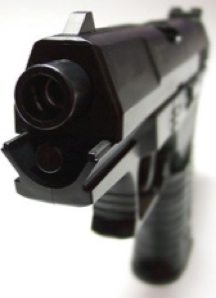






















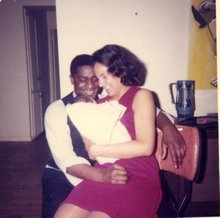

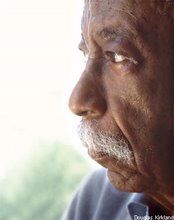


1 comment:
Wow!!! Hate that I missed this at the time.
Two related documentaries to watch:
Bastards of the Party
Straight from the Streets
http://www.allhiphop.com/stories/multimedia__video/archive/2009/05/19/21583125.aspx
Post a Comment